
The Evolution editorial team seeks Associate Editors to serve three-year terms beginning January 2025. Associate Editors receive free membership in SSE for the duration of their term and free registration for the annual Evolution meeting.
We strongly encourage nominations and self-nominations of individuals who represent the full diversity of the evolutionary biology community, including (but not limited to) all aspects of identity and background, types of institution, geographic location, or scientific approach.
To indicate your interest, provide your affiliation, research interests, and contact information in this short form.
Deadline: October 31
 The Evolution editorial team seeks Associate Editors to serve three-year terms beginning January 2024. Twenty editors will be selected and notified this fall.
The Evolution editorial team seeks Associate Editors to serve three-year terms beginning January 2024. Twenty editors will be selected and notified this fall.
Associate Editors receive free membership in SSE for the duration of their term and free registration for the annual Evolution meeting.
We strongly encourage nominations and self-nominations of individuals who represent the full diversity of the evolutionary biology community, including (but not limited to) all aspects of identity and background, types of institution, geographic location, or scientific approach.
To indicate your interest, provide your affiliation, research interests, and contact information in this short form.
Deadline: September 27, 2023
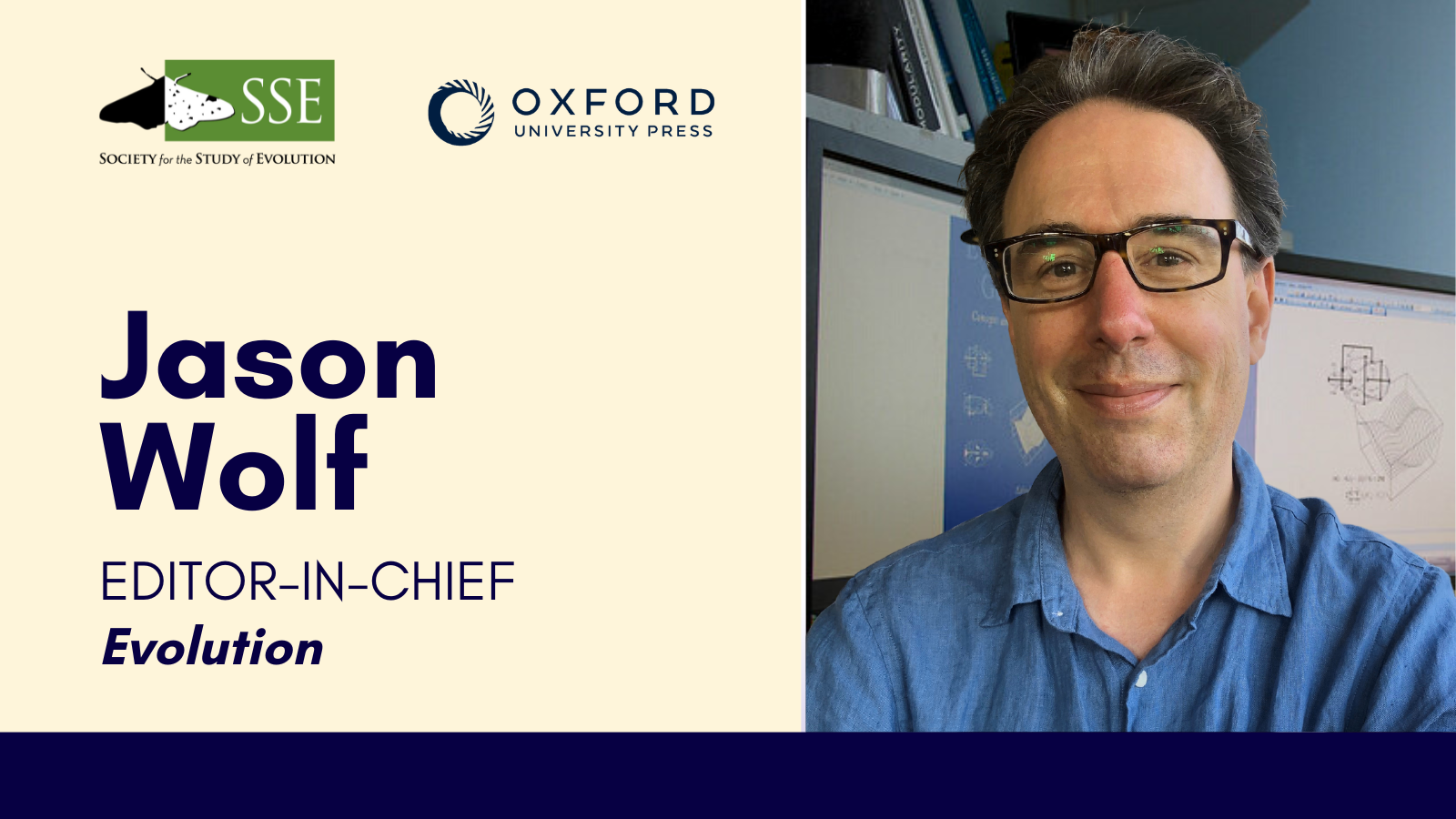
SSE is pleased to welcome Dr. Jason Wolf as Editor-in-Chief of Evolution. Dr. Wolf is Professor of Evolutionary Genetics in the Milner Centre for Evolution and Department of Life Sciences at the University of Bath. His research integrates theoretical, computational, and empirical quantitative and population genetic techniques to understand the evolutionary genetics of interactions across different levels of biological organization.
Dr. Wolf will serve a three-year term as Editor-in-Chief, and succeeds Dr. Tracey Chapman. Thank you Dr. Chapman for all of your work, and welcome Dr. Wolf!
Read the latest articles in Evolution, or submit your research for publication.
The new Evolution English Language Support (EELS) Program offers free, light touch editing for authors submitting to Evolution for whom English is not their preferred language. To participate in this program, authors can contact the EELS program coordinator before submission at EELScoordinator@gmail.com, or indicate during manuscript submission that they are willing to be contacted during the review process about this language support.
Evolution publishes exclusively in English, which can present additional challenges to authors for whom English is an additional language. The EELS Program is intended to help reduce barriers to scientific publishing by providing such authors with an opportunity for additional support.
Learn more about the EELS program or how to submit to Evolution.
We are excited to be working with Oxford University Press to publish our journals starting in 2023. Beginning in January, all Evolution and Evolution Letters articles will be available at the new Oxford University Press websites for Evolution and Evolution Letters. Newly accepted articles in Evolution are currently free to view on the OUP site. All previously published articles are still available through Wiley websites (Evolution, Evolution Letters). These will remain available through Wiley until the entire archive has been transferred to OUP. Article submission is still through ScholarOne (submit to Evolution, Evolution Letters). Please contact our new Managing Editor Melinda Modrell (managingeditor@evolutionsociety.org) with any questions.

SSE and the European Society for Evolutionary Biology (ESEB) are pleased to welcome Dr. Melinda Modrell, who is stepping into the new role of in-house Managing Editor for Evolution and Evolution Letters.
Dr. Modrell is based at the Museo Nacional de Ciencias Naturales in Madrid, Spain. She earned her Ph.D. in Integrative Biology from UC Berkeley and completed postdocs at the University of Cambridge. She has been working as a self-employed editor and consultant since 2016, providing science and language editing services to primarily non-native English speakers. Dr. Modrell will work closely with the editors of Evolution and Evolution Letters and the staff at Oxford University Press to help our societies continue publishing leading research from our evolutionary biology community.
Evolution is the flagship journal of the Society for the Study of Evolution. Evolution Letters is an Open Access journal jointly owned by ESEB and SSE. Starting in January 2023, both journals will be published by Oxford University Press. Learn more about this transition here.
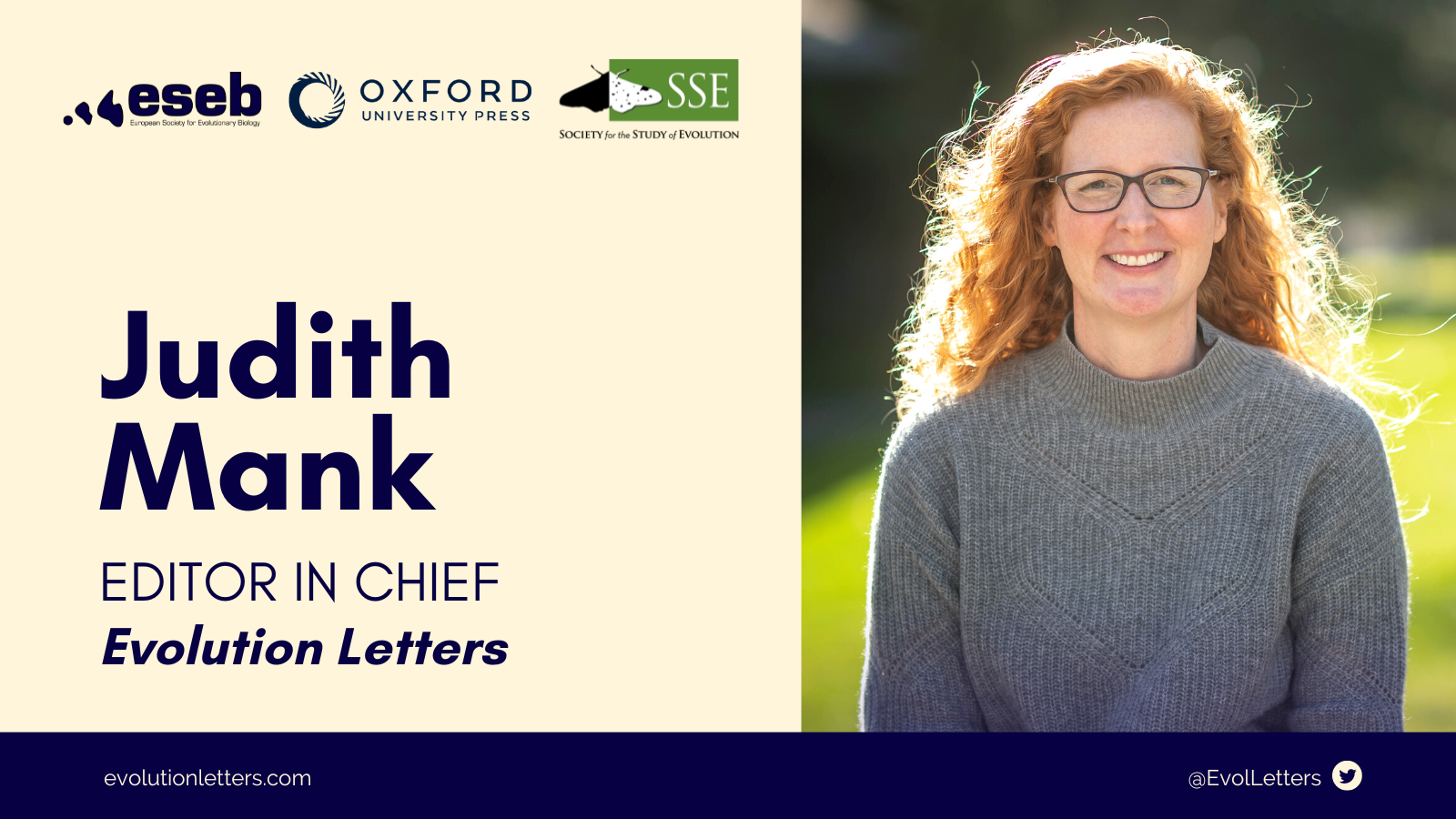
SSE and the European Society of Evolutionary Biology are pleased to welcome Dr. Judith Mank as the new Editor in Chief for Evolution Letters. Dr. Mank is a professor of evolutionary genomics at the University of British Columbia, where she studies sexual dimorphism and its underlying genomic and transcriptomic factors. Dr. Mank succeeds Dr. Jon Slate, who has served as the journal’s Editor in Chief since its inception in 2017. Dr. Mank’s term will begin in March 2023. We thank Dr. Slate for his service, and look forward to working with Dr. Mank to continue publishing cutting-edge new research in all areas of evolutionary biology.
Beginning in January 2023, Evolution Letters will be published by Oxford University Press. Learn more here.
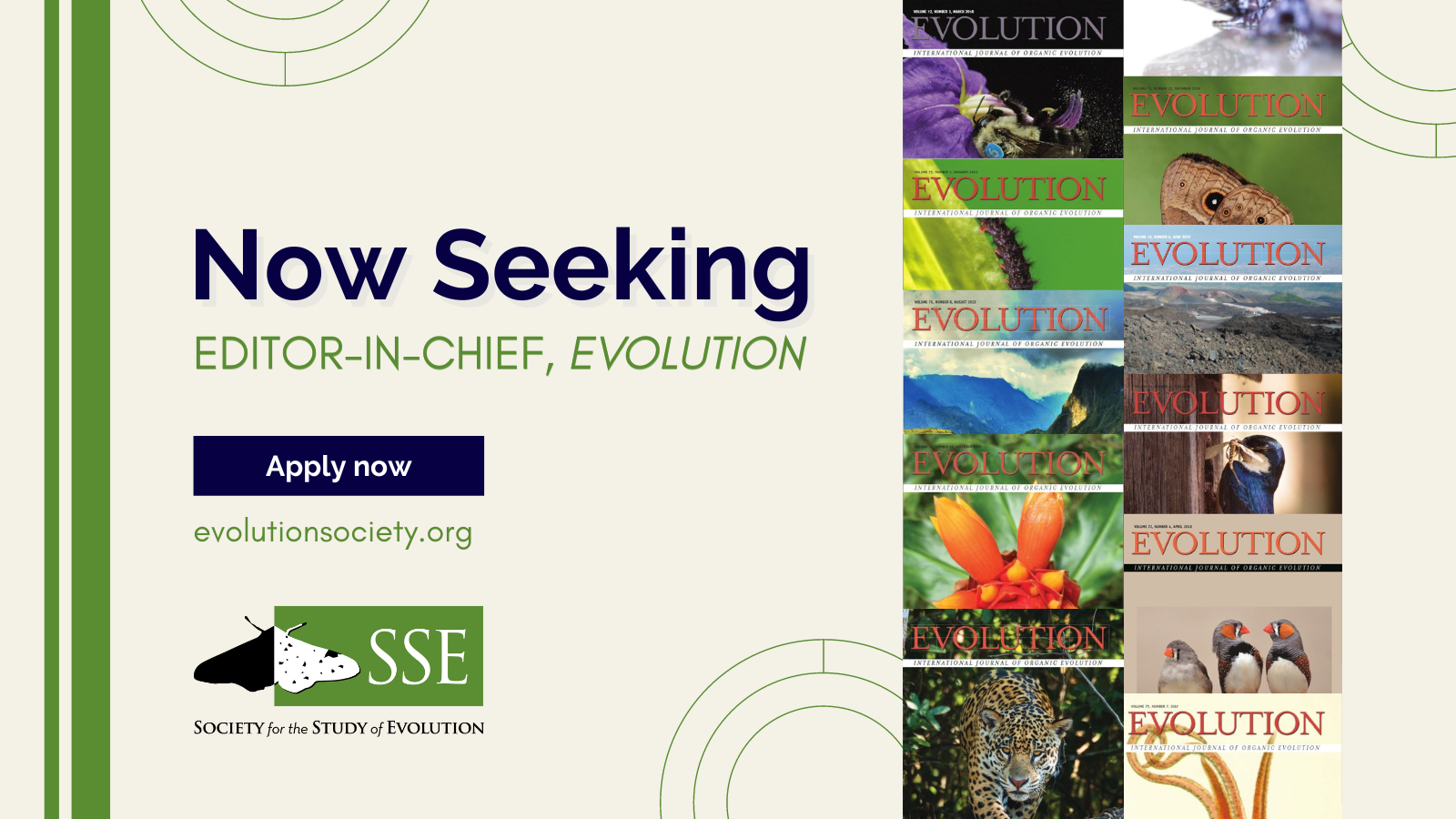
The Society for the Study of Evolution (SSE) seeks to fill the role of Editor in Chief (EiC) for the society’s flagship journal, Evolution, which aims to publish leading research from across the field of evolutionary biology.
The EiC is expected to be an evolutionary biologist with a broad overview of the field. Main responsibilities are building on the success of the journal, fostering the journal’s growth with a focus on maintaining its quality, and encouraging submissions of the best research articles in the field. The EiC will oversee and work hand in hand with a board of Handling Editors and Associate Editors, our publisher, the Digests Editor, a social media/communications editor, and a Managing Editor. We encourage applications from scientists from across career stages and from all subdisciplines related to evolutionary biology. While preferred, you do not have to be a current member of SSE to apply.
Diversity, equity, and inclusion are core values of SSE. We are committed to ensuring that all of our activities reflect those values. We strongly encourage applications from researchers identifying as members of historically marginalized groups in STEM.
Continue reading for full instructions.
We are pleased to announce that starting in January 2023, Evolution and Evolution Letters will be published by Oxford University Press. This decision comes after more than a year of work by our Publications Committee in consultation with the councils of SSE and the European Society for Evolutionary Biology, our co-publisher of Evolution Letters. SSE members will still enjoy free publication in Evolution and deep discounts on Open Access publication in both journals. Additionally, fee waivers will be offered to Evolution Letters authors as needed to help overcome financial barriers to publishing Open Access work. Authors will still submit manuscripts through ScholarOne. Articles submitted after October 1 for Evolution and after December 1 for Evolution Letters will be managed through OUP.
OUP has a strong history of publishing society journals, and we look forward to working with them to continue to publish significant new advances from our members and community! Read the full announcement from OUP.
Evolution seeks nominations and self-nominations for Associate Editors to serve on the Evolution editorial board. We strongly encourage nominations and self-nominations of individuals who represent the full diversity of the evolutionary biology community, including (but not limited to) all aspects of identity and background, types of institution, geographic location, or scientific approach. We strongly encourage nominations and self-nominations of individuals who have a demonstrated commitment to advancing equity and inclusion in science. There are 20 associate editor positions open every year, with 3-year terms beginning January 1. Nominate yourself or someone else by September 30, 2022.
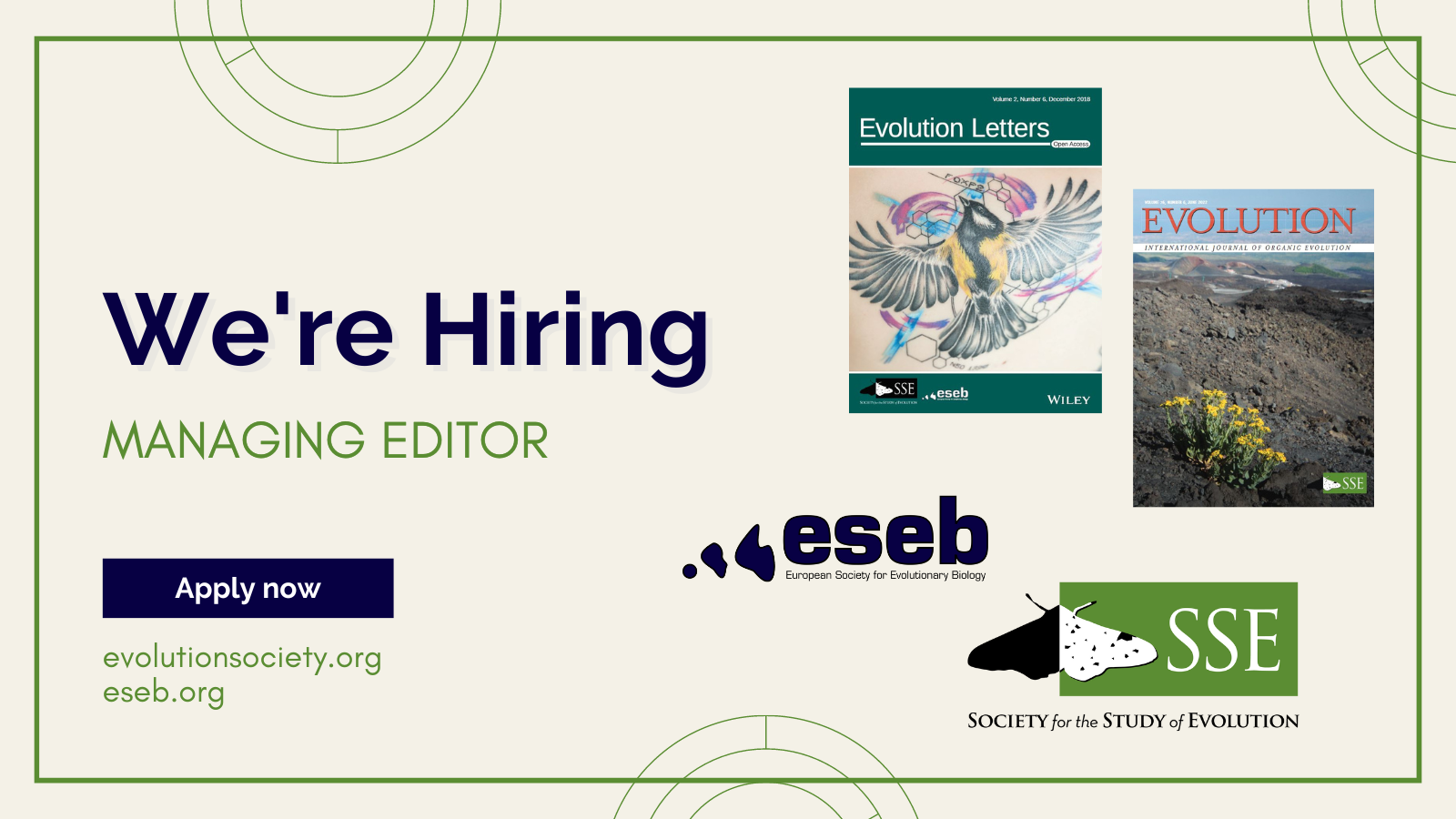
We are excited to announce a new Managing Editor position for Evolution and Evolution Letters. This role will include the management of all aspects of receiving, reviewing and processing submitted manuscripts for both journals. It will also involve the coordination of special and virtual issue content, and raising the profile of the journals through media platforms. Continue reading for more information.
This position has now been filled.
The Society for the Study of Evolution (SSE) and the European Society for Evolutionary Biology (ESEB) are looking for a new Editor in Chief for the journal Evolution Letters. Evolution Letters was established in 2017 and is jointly run by the two societies. An Open Access journal, it aims to publish leading research from across the field of evolutionary biology.
The Editor in Chief is expected to be an established evolutionary biologist with a broad overview of the field. Main responsibilities are building on the initial success of the journal, fostering continued growth, with a focus on maintaining its quality and encouraging submission of the best research articles in the field. The Editor in Chief will oversee and work hand in hand with a board of Associate Editors, our publishers, and a Managing Editor.
Applications are due June 15, 2022. Continue reading to learn more.
If you are interested in taking part in a pilot program to provide cost-free language support to potential authors of manuscripts in Evolution, please read on!
The Society for the Study of Evolution (SSE) and the journal Evolution are committed to reducing barriers to scientific publishing and access. Evolution publishes exclusively in English, which can present additional challenges to authors for whom English is an additional language. The EELS program aims to provide an opportunity for additional support to such authors. EELS will offer the opportunity for English language editing to authors submitting articles to Evolution, with the aim of improving the clarity of writing prior to manuscript review. The EELS program stems from discussions between the SSE Diversity Committee and the Evolution Editors, and is based on the Language Editor position at the American Society of Mammalogists. We will assess its effectiveness after a one-year pilot test. Applications for the EELS Editors will be collected on a rolling basis. Applications for the EELS Coordinator are due May 1, 2022. Applications for EELS Editors are due July 1, 2022.
Continue reading to learn more about the positions and how to apply.
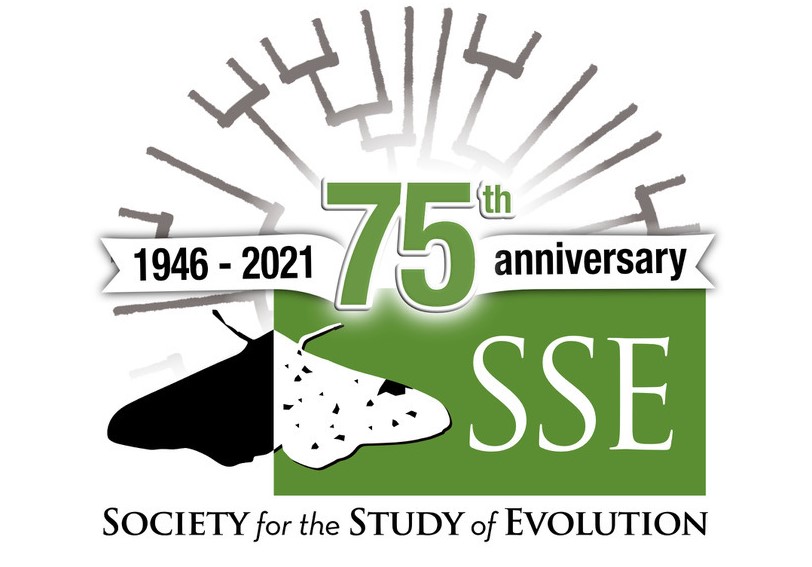 Last year, SSE celebrated its 75th anniversary. As part of this celebration, SSE hosted a symposium at the 2021 Virtual Evolution meeting to commemorate this anniversary with a series of talks representing SSE’s long-standing and continuing commitment to expanding evolutionary understanding. The papers collected in this special issue will present the work of the symposium speakers, including Amanda K. Gibson, John Beatty, Martha Munoz, Brandon Ogbunu, and Noah Whiteman. Keep an eye out for this special issue, to be released later this year with an introduction by María Rebolleda-Gómez and former SSE President Ruth Shaw.
Last year, SSE celebrated its 75th anniversary. As part of this celebration, SSE hosted a symposium at the 2021 Virtual Evolution meeting to commemorate this anniversary with a series of talks representing SSE’s long-standing and continuing commitment to expanding evolutionary understanding. The papers collected in this special issue will present the work of the symposium speakers, including Amanda K. Gibson, John Beatty, Martha Munoz, Brandon Ogbunu, and Noah Whiteman. Keep an eye out for this special issue, to be released later this year with an introduction by María Rebolleda-Gómez and former SSE President Ruth Shaw.
Starting in April, Evolution will accept two new article types: Evolution Insights and Evolution Reviews. Reviews will synthesize research fields and provide novelty through new or significantly updated research syntheses and will be limited to 4500 words. Insights will provide insights or summaries of emerging hot topics, observations, theory, controversies, and new and unresolved questions, and will be limited to 1500 words. Learn more about Evolution’s other article types here.
Earlier this year, the SSE Evolution Journal Taskforce distributed a survey to members of SSE and the European Society of Evolutionary Biologists (ESEB) to collect feedback from the community on authors' perspectives on the journal Evolution and priorities when choosing where to publish. Your feedback is now being used to devise new initiatives to increase quality submissions from existing and new audiences and improve the journal reputation and author experience. Thank you to all who participated!
Review the full data, or read the text summary here.
Evolution Letters seeks to fill three positions to begin early 2022: Communications Editor, Preprints Editor, and Associate Editor.
Applications are due Friday, 17 December. Continue reading to learn more.
The Evolution Highlights series showcases some of the interesting and varied papers published within the last few years in Evolution. The goal of these Evolution Highlights is to let our readers learn more about how the highlighted study came into existence and to invite the authors to share stories and tips from the perspective of a recently published author. We welcome nominations and self-nominations for this series.
Here we highlight "Quantifying the relative contributions of the X chromosome, autosomes, and mitochondrial genome to local adaptation." Evolution Highlight by Clementine Lasne.
The Evolution Highlights series showcases some of the interesting and varied papers published within the last few years in Evolution. The goal of these Evolution Highlights is to let our readers learn more about how the highlighted study came into existence and to invite the authors to share stories and tips from the perspective of a recently published author. We welcome nominations and self-nominations for this series.
Here we highlight "Virulence-driven trade offs in disease transmission: A meta-analysis." Evolution Highlight by Miguel Acevedo.
The Evolution Highlights series showcases some of the interesting and varied papers published within the last few years in Evolution. The goal of these Evolution Highlights is to let our readers learn more about how the highlighted study came into existence and to invite the authors to share stories and tips from the perspective of a recently published author. We welcome nominations and self-nominations for this series.
Here we highlight "Antibody-mediated crosslinking of gut bacteria hinders the spread of antibiotic resistance." Highlight by Anne-Florence Bitbol and Claude Loverdo.
The Evolution Highlights series showcases some of the interesting and varied papers published within the last few years in Evolution. The goal of these Evolution Highlights is to let our readers learn more about how the highlighted study came into existence and to invite the authors to share stories and tips from the perspective of a recently published author. We welcome nominations and self-nominations for this series.
Here we highlight "Comparing individual and population measures of senescence across 10 years in a wild insect population." Highlight by Tom Tregenza.

In celebration of SSE’s 75th anniversary in 2021, Evolution will be accepting and publishing monthly Perspectives throughout the year to highlight the major scientific contributions published in Evolution since its inception and their continuing influence on the field. If you are interested in contributing a Perspective on an Evolution paper that has significantly shaped your work, please first express your interest by emailing Evolution EiC Tracey Chapman at Tracey.Chapman@uea.ac.uk. Prospective articles will then be submitted using the usual online submission process, with a lead in time of approximately two months. We look forward to reading the accepted pieces and celebrating SSE’s achievements over three-quarters of a century!
The Evolution Highlights series showcases some of the interesting and varied papers published within the last few years in Evolution. The goal of these Evolution Highlights is to let our readers learn more about how the highlighted study came into existence and to invite the authors to share stories and tips from the perspective of a recently published author. We welcome nominations and self-nominations for this series.
Here we highlight "Ecological divergence plays an important role in strong but complex reproductive isolation in campions (Silene)." Highlight by Sophie Karrenberg.
The Evolution Highlights series showcases some of the interesting and varied papers published within the last few years in Evolution. The goal of these Evolution Highlights is to let our readers learn more about how the highlighted study came into existence and to invite the authors to share stories and tips from the perspective of a recently published author. We welcome nominations and self-nominations for this series.
Here we highlight "In love and war: The morphometric and phylogenetic basis of ornamentation, and the evolution of male display behavior, in the livebearer genus Poecilia." Highlight by Daniel Goldberg.
We are pleased to announce a new series, Evolution Highlights. Each month, this series will highlight some of the interesting and varied papers published within the last few years in Evolution. This month, we highlight "How mountains shape biodiversity: The role of the Andes in biogeography, diversification, and reproductive biology in South America’s most species-rich lizard radiation (Squamata: Liolaemidae)." Highlight by Damien Esquerré.